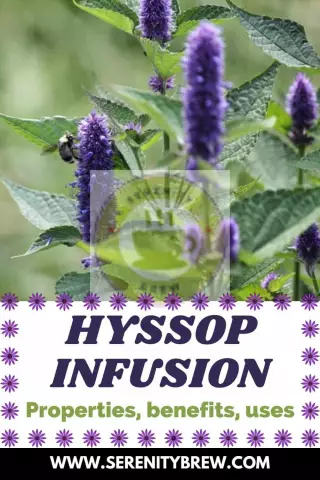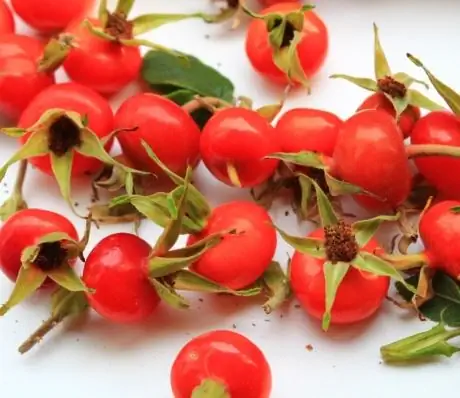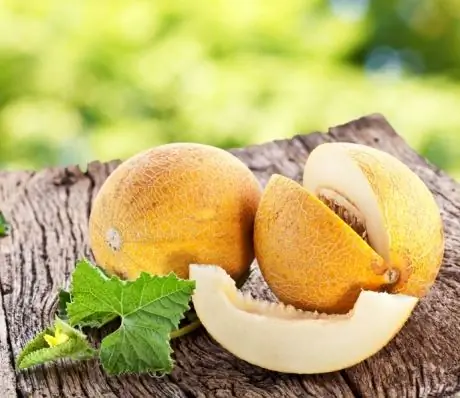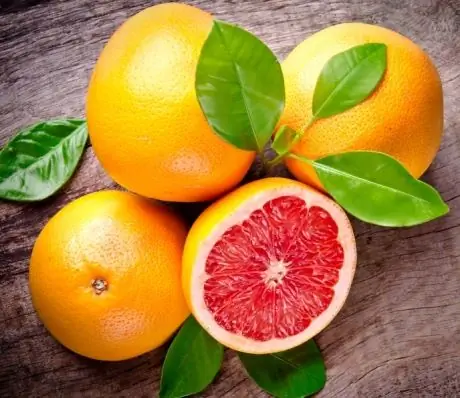- Author Rachel Wainwright [email protected].
- Public 2023-12-15 07:39.
- Last modified 2025-11-02 20:14.
Hyssop medicinal
Instructions for use:
- 1. Chemical composition
- 2. Useful properties
- 3. Indications for use
- 4. Contraindications
- 5. Home remedies from medicinal hyssop

Hyssop officinalis is a species of the genus Hyssop of the family Lipocytes, or Lamb. It is a semi-shrub 20-50 cm in height with a strong balsamic smell. Possesses high pharmacological activity, excellent honey plant. In many countries and regions, including the Caucasus and the south of the European part of Russia, it is cultivated as an essential oil, spice and ornamental plant.
The tops of flowering shoots are used in medicine and homeopathy in many countries of the world, including Portugal, Sweden, France, Bulgaria, Germany and Romania. In official medicine of the Russian Federation, hyssop is not used, but is widely used as a raw material for biologically active additives (BAA) and in folk medicine.
Chemical composition
The tops of flowering shoots and the herb of hyssop medicinal contains essential oil, in the grass - pigments, gum, resins, bitter and tannins, triterpenic acids (oleanolic and ursolic), aromatic substances (aldehydes, phenols, alcohols, ketones), in flowers - flavonoids (diosmin, hyssopin).
The essential oil contains: 1-pinocampheol and its acetic ester, 1-pinocampon, camphene, cineole, sesquiterpenes, α-pinene, β-pinene.
Beneficial features
Medicinal properties of medicinal hyssop:
- carminative;
- expectorant;
- wound healing;
- anti-spasmodic;
- disinfectant.
In addition, the herb:
- stimulates appetite;
- promotes the secretion of gastric juice and digestion;
- reduces sweating;
- has a weak diuretic effect;
- increases the secretion of mucus in the upper respiratory tract.
Indications for use
The herb infusion is taken as an expectorant for chronic diseases of the upper respiratory tract (laryngitis, tracheitis, bronchitis) and bronchial asthma, as well as externally as a wound-healing agent.
In Bulgaria, medicinal hyssop is used for dyspepsia and constipation, as well as for anemia. The flowering tops and leaves of the plant are used for diseases of the gastrointestinal tract, flatulence, chronic colitis, excessive sweating, neuroses, rheumatism, anemia, angina pectoris, as a light tonic, diuretic and antihelminthic agent.
Hyssop essential oil is useful for inflammatory diseases of the respiratory system, heart disease and urolithiasis.
The decoction and infusion of hyssop are used in the form of compresses for bruises, wounds and bruises, for eczema, for washing the eyes, for rinsing for diseases of the pharynx, stomatitis and hoarseness.
Contraindications
- increased nervous irritability;
- epilepsy;
- increased acidity of the gastrointestinal tract;
- kidney disease;
- hypotension;
- children under 12 years old;
- pregnancy and lactation;
- hypersensitivity to the plant.
Excessive use of medicinal hyssop can cause side effects such as a sharp decrease in blood pressure, palpitations, convulsions.
Home remedies from medicinal hyssop
- from eczema: pour 100 g of dried herbs into 1 liter of boiling water, insist until it cools, strain, pour the infusion into a prepared warm bath. Take a bath for 20 minutes daily until the skin inflammation stops;
- from hematoma: chop fresh grass to a mushy state, attach to the hematoma, tie with a bandage, leave for 30 minutes. It is recommended to do 2-3 compresses per day;
- from colitis: 1 tbsp. l. Pour 250 ml of boiling water over the crushed raw materials of the plant, cover with a lid, insist for an hour, strain. Take 15 minutes before meals 3 times a day for 14 days;
- from bronchitis: pour 10 g of flowers with 150 ml of boiling water, insist for 1 hour, add 20 g of sugar, mix well until it dissolves. Take 2 times a day, 50 ml for 10 days;
- for colds: combine 10 drops of juice or hyssop essential oil with 5 drops of eucalyptus or thyme oil and 20 ml of sunflower oil. Rub the area of the back and chest with this product;
- from shortness of breath, which can occur in diseases of the lungs and heart pathologies: grind dry or fresh grass to a powdery state, combine with honey in equal parts. Take 1 tsp with water. 3 times a day for 20 days.

Maria Kulkes Medical journalist About the author
Education: First Moscow State Medical University named after I. M. Sechenov, specialty "General Medicine".
Information about the drug is generalized, provided for informational purposes only and does not replace the official instructions. Self-medication is hazardous to health!






